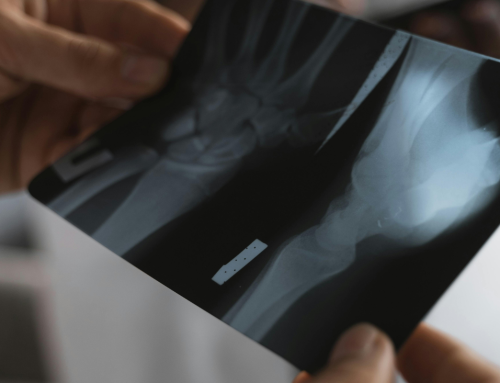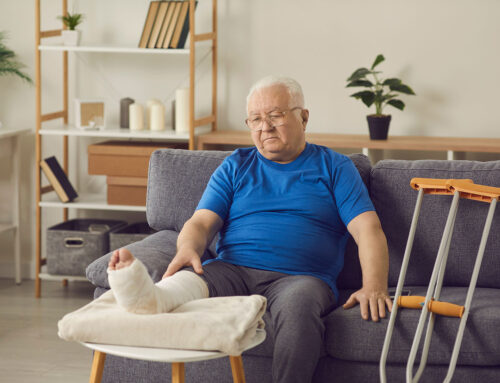In the ever-paced world, rest and sleep can often be sidelined in favour of productivity and progress. However, these two seemingly passive activities play a pivotal role that deserves more credit when it comes to the critical process of fracture healing. Sometimes rest is genuinely the most productive thing you can do. Read on to find out more about the importance of sleep and relaxation in the healing process.

Understanding Rest and Sleep in Healing
Rest, in the context of fracture healing, isn't simply about refraining from physical activity. It involves allocating dedicated periods for your body to focus on repair and recovery, undistracted by other strenuous demands. Sleep, a vital form of rest, is an active physiological process that profoundly affects the body's healing mechanisms.
The Benefits of Rest and Sleep in Fracture Healing
1. Facilitates Cellular Repair and Regeneration
Rest and sleep serve as catalysts for the body's natural regenerative processes. During periods of rest, particularly during deep sleep stages, the body enhances its production of growth hormones essential for tissue repair and regeneration.
2. Reduces Inflammation and Pain
Rest and sleep can decrease the body's production of cytokines, which are proteins that can trigger inflammation and pain. By reducing inflammation, rest, and sleep can help create a more favourable environment for healing.
3. Enhances Immune Function
Adequate sleep is crucial for proper immune function. During sleep, the body can bolster its defence mechanisms, which is critical in preventing infection and aiding overall healing.
How Rest and Sleep Aid the Fracture Healing Process
1. Prioritize Quality Sleep
Getting quality sleep isn't just about quantity—it's about creating a sleep environment that promotes deep, restorative stages of sleep. Make your bedroom a tranquil sanctuary, free of electronic devices, with a comfortable bed and a cool temperature.
2. Incorporate Rest Periods Throughout the Day
It’s essential to allow your body time to recover during the day, especially if you are incorporating gentle exercise into your recovery routine. These rest periods can be as simple as lying down, reading a book, or other restful activities that allow your body to relax and recuperate.
3. Pay Attention to Nutrition
Nutrition is indirectly related to rest and sleep. Consuming a balanced diet that includes protein, vitamins, and minerals, especially calcium and vitamin D, supports the body's natural healing processes during restful periods.
4. Seek Professional Guidance
Every fracture and every individual is unique. Depending on the nature of your fracture and your overall health, your healthcare provider can provide personalized advice regarding how much rest and sleep you need to aid your healing process.
Rest and sleep are far from being inactive periods in the context of fracture healing. They are, in fact, periods of heightened biological activity, essential for optimal recovery. When you rest and sleep, you are not merely 'doing nothing.' You are actively aiding your body's healing mechanisms, facilitating faster, more efficient recovery.
In the journey of fracture healing, every aspect plays a significant role - from the medical interventions you receive, the nutrition you provide to your body, and the exercises you might engage in, to the seemingly passive hours of rest and sleep. Together, these elements blend to create a symphony of recovery - a process that may be complex but is undoubtedly remarkable.
Never underestimate the power of a good night's sleep or the rejuvenation brought by periods of rest. Harness these periods, respect your body's need for them, and you'll find yourself not just on the road to recovery but potentially on the path to better overall health and well-being.
Remember: Rest is not lazy. As you lie down to sleep, know that you are laying the foundations for a stronger tomorrow. When you rest, you're providing your body with the optimal conditions for repair and renewal.
Fracture healing is a complex process, yet it's a process that your body is remarkably well-equipped to handle. By understanding the importance of rest and sleep in this journey, you're empowering yourself to support your body's natural healing mechanisms.
Whether it's modifying your sleep environment to facilitate better quality sleep, incorporating periods of rest throughout your day, or seeking professional guidance to tailor a healing plan to your unique needs. Every step you take towards honouring the role of rest and sleep in fracture healing is a step towards a faster, more efficient recovery.
In the end, remember this: rest and sleep are not just essential aspects of healing; they are integral elements of a balanced, healthy lifestyle. As you navigate your healing journey, the habits you form and the insights you gain about rest and sleep extend far beyond the recovery period, enriching your overall well-being in the long run.
In every stage of fracture healing, from the initial inflammation to the final remodelling, rest and sleep are your powerful allies. Embrace them, respect them, and let them guide you on your path to recovery.
To help your fracture heal faster, there’s more beyond rest that you can do to accelerate recovery. Fracture Healing’s LIPUS (low-intensity pulsed ultrasound) device can heal non-union fractures by 86% and, on average, heal fresh fractures 38% faster. Contact us to get your questions answered, or order your device today.
Do you prioritize productivity over sleep? How can you slow down and be more intentional with rest in your everyday activities? Share your experience with our readers in the comments below.





